- Calendar
- Online Ticket Sales
- Access
- JA
- EN
Suntory Museum of Art 60th Anniversary Exhibition
Special Exhibition Prince Shotoku:
In Commemoration of his 1400th Grand Memorial
November 17, 2021 to January 10, 2022
*There will be an exhibition change during the course of exhibition.
*Download the list of changes in works on display
The list of changes in worksPDF
Chapter 1
Exploring the Life of Prince Shotoku
Prince Shotoku (574–622) is renowned for having built the foundations of the Japanese state while serving as regent under Empress Suiko. He established a twelve-cap court rank system and he formulated the Seventeen Article Constitution, for example. He also dispatched envoys to Sui Dynasty China with a letter reading “From the Emperor in the Land of the Rising Sun.” Furthermore, he promulgated Buddhism after winning his battle against the anti-Buddhist clan leader Mononobe no Moriya, with the Prince later venerated as a forefather of Japanese Buddhism.
He also founded Shitenno-ji in Osaka, with his life immortalized in the temple’s 8th-century Illustrated Biography of Prince Shotoku. This was the first of many illustrated biographies that proliferated as the Prince became a figure of worship.
This chapter explores Prince Shotoku’s life through illustrated biographies and other narrative works as well as through Asuka-period objects that purportedly belonged to the Prince himself.
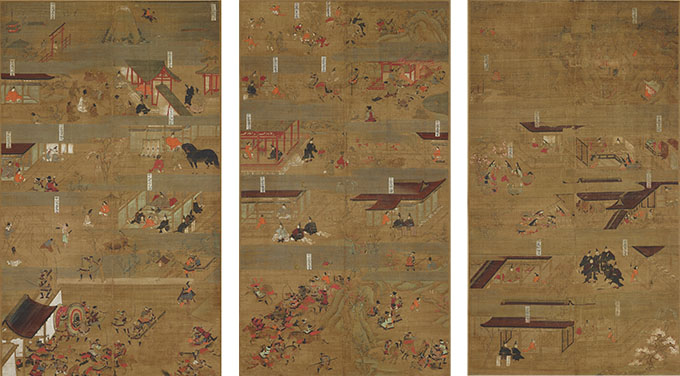
Totomi Hokkyo
Three of six hanging scrolls
Kamakura period, dated 1323
Shitenno-ji Temple, Osaka (Picture provided by Nara National Museum)
【To be shown between Nov. 17 and Dec. 13】
Chapter 2
The Spread of Prince Shotoku Worship
After his passing, Prince Shotoku was deified for his role in promulgating Buddhism in Japan. He was viewed as an incarnation of the deity Kannon, for instance, or of Nanyue Huisi (Eshi), an eminent priest from China’s Tiantai school of Buddhism. In this way, Shotoku inspired religious devotion among men and women from all walks of life, including Buddhist patriarchs like Saicho, Shinran and Ippen. In particular, Shinran revered Prince Shotoku as the Japanese incarnation of Sakyamuni, the founder of Buddhism.
This veneration led to the creation of paintings and sculptures depicting Shotoku in various forms, including the Prince at age two, the young Prince praying for Emperor Yomei’s recovery from illness, and the adult Prince striving to build the Japanese state and promote Buddhism.
This chapter introduces these diverse depictions of Prince Shotoku alongside items associated with the spread of Prince Shotoku worship among Japan’s Buddhist schools.
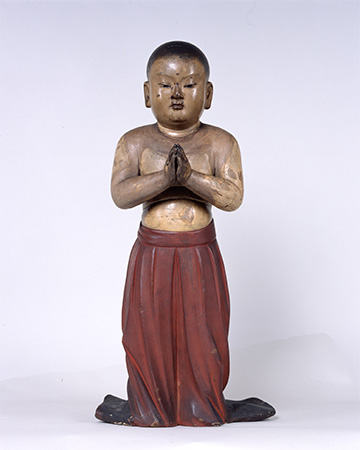
Kamakura period, 13th–14th century
Byakugo-ji Temple, Kyoto
(Picture provided by Kanagawa Prefectural Kanazawa-Bunko Museum,
Photo by Masayoshi Nokubo)
【To be shown over an entire period】
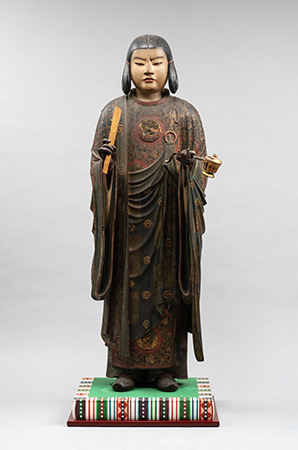
Kamakura period, 14th century
Zenju-ji Temple, Ibaraki
(Picture provided by Kanagawa Prefectural Kanazawa-Bunko Museum, Photo by Kumiko Inoue)
【To be shown over an entire period】
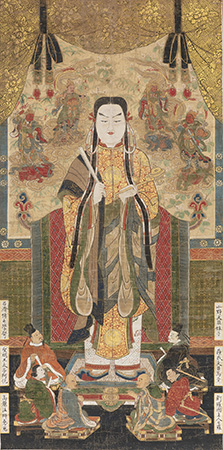
Momoyama period, 16th century
Shitenno-ji Temple, Osaka
【To be shown over an entire period】
Chapter 3
Shitenno-ji: The 1400-year History of the Temple Founded by Prince Shotoku
Shitenno-ji in Osaka is Japan’s oldest state-sponsored temple. It was established by Prince Shotoku in 593, the first year of Empress Suiko’s reign. The temple’s roots lie in Shotoku’s conflict with the anti-Buddhist clan leader Mononobe no Moriya. During this time, the Prince sculpted statues of the Four Guardian Kings and he vowed to build a temple dedicated to them if they answered his prayer for victory.
The Legends of Shitenno-ji Temple (Konpon Version) was purportedly written by Prince Shotoku himself. It was found within Shitenno-ji in 1007 and its discovery led to the flourishing of Prince Shotoku worship and other inclusive creeds, including Kannon worship, the Pure Land faith, and belief in Prince Shotoku’s prophecies, with Shitenno-ji strengthening its position as a sacred site of Prince Shotoku worship.
Shitenno-ji was destroyed by war and disaster several times during its long history, but each time it rose anew thanks to the unceasing devotion felt for Prince Shotoku.
This chapter explores Shitenno-ji’s 1400-year history through several precious artifacts associated with the temple.

1 scroll, Nanbokucho period, dated 1335
Shitenno-ji Temple, Osaka
【To be shown between Dec. 15 and Jan. 10】
Chapter 4
Portrayals of Prince Shotoku in the Modern Era
Prince Shotoku was worshipped as the forefather of Japanese Buddhism, but his role as the politician who built the foundations of the Japanese state also rose to prominence during the Meiji era (1868–1912). Reverence for the Prince and his achievements led to his portrait being selected to appear on the face of banknotes during the Showa era. Since then, he has featured on several types of banknote, more than anyone else. The portrait of the Shotoku holding a wooden mace has done much to cement the modern image of the Prince. He also became a more familiar presence thanks to his role as the protagonist in the popular manga series Hi Izuru Tokoro no Tenshi (Emperor of the Land of the Rising Sun) .
In 2021, meanwhile, Shitenno-ji temple installed a new Young Prince Shotoku in Half Lotus Position statue ahead of the commemorations of the Prince’s passing. This conveys a sense of how veneration for Prince Shotoku endures from the past, through to the present and into the future.
This chapter examines portrayals of Prince Shotoku in the modern era. It also features items associated with contemporary Prince Shotoku worship, including bugaku equipment used in services held at Shitenno-ji temple to commemorate the Prince’s passing.
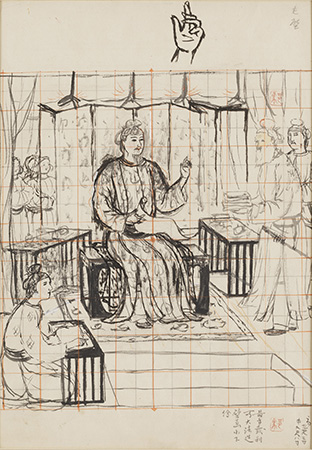
Domoto Insho, One of three drafts
Showa era, dated 1951
Kyoto Prefectural Insho-Domoto Museum of Fine Arts
【To be shown over an entire period】
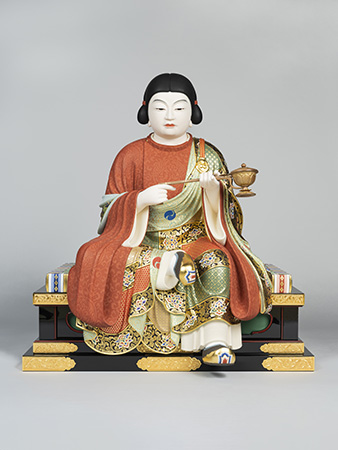
Matsuhisa Sohrin Buddhist Studio
Reiwa era, dated 2021
Shitenno-ji Temple, Osaka
【To be shown over an entire period】
*Unauthorized reproduction or use of texts or images from this site is prohibited.
2024 January
- Exhibition
- Closed
- Tea Ceremony
- Mon
- Tue
- Wed
- Thu
- Fri
- Sat
- Sun
- 1
- 2
- 3
- 4
- 5
- 6
- 7
- 8
- 9
- 10
- 11
- 12
- 13
- 14
- 15
- 16
- 17
- 18
- 19
- 20
- 21
- 22
- 23
- 24
- 25
- 26
- 27
- 28
- 29
- 30
- 31
2024 February
- Exhibition
- Closed
- Tea Ceremony
- Mon
- Tue
- Wed
- Thu
- Fri
- Sat
- Sun
- 1
- 2
- 3
- 4
- 5
- 6
- 7
- 8
- 9
- 10
- 11
- 12
- 13
- 14
- 15
- 16
- 17
- 18
- 19
- 20
- 21
- 22
- 23
- 24
- 25
- 26
- 27
- 28
- 29
2024 March
- Exhibition
- Closed
- Tea Ceremony
- Mon
- Tue
- Wed
- Thu
- Fri
- Sat
- Sun
- 1
- 2
- 3
- 4
- 5
- 6
- 7
- 8
- 9
- 10
- 11
- 12
- 13
- 14
- 15
- 16
- 17
- 18
- 19
- 20
- 21
- 22
- 23
- 24
- 25
- 26
- 27
- 28
- 29
- 30
- 31
2024 April
- Exhibition
- Closed
- Tea Ceremony
- Mon
- Tue
- Wed
- Thu
- Fri
- Sat
- Sun
- 1
- 2
- 3
- 4
- 5
- 6
- 7
- 8
- 9
- 10
- 11
- 12
- 13
- 14
- 15
- 16
- 17
- 18
- 19
- 20
- 21
- 22
- 23
- 24
- 25
- 26
- 27
- 28
- 29
- 30
2024 May
- Exhibition
- Closed
- Tea Ceremony
- Mon
- Tue
- Wed
- Thu
- Fri
- Sat
- Sun
- 1
- 2
- 3
- 4
- 5
- 6
- 7
- 8
- 9
- 10
- 11
- 12
- 13
- 14
- 15
- 16
- 17
- 18
- 19
- 20
- 21
- 22
- 23
- 24
- 25
- 26
- 27
- 28
- 29
- 30
- 31
2024 June
- Exhibition
- Closed
- Tea Ceremony
- Mon
- Tue
- Wed
- Thu
- Fri
- Sat
- Sun
- 1
- 2
- 3
- 4
- 5
- 6
- 7
- 8
- 9
- 10
- 11
- 12
- 13
- 14
- 15
- 16
- 17
- 18
- 19
- 20
- 21
- 22
- 23
- 24
- 25
- 26
- 27
- 28
- 29
- 30
2024 July
- Exhibition
- Closed
- Tea Ceremony
- Mon
- Tue
- Wed
- Thu
- Fri
- Sat
- Sun
- 1
- 2
- 3
- 4
- 5
- 6
- 7
- 8
- 9
- 10
- 11
- 12
- 13
- 14
- 15
- 16
- 17
- 18
- 19
- 20
- 21
- 22
- 23
- 24
- 25
- 26
- 27
- 28
- 29
- 30
- 31
2024 August
- Exhibition
- Closed
- Tea Ceremony
- Mon
- Tue
- Wed
- Thu
- Fri
- Sat
- Sun
- 1
- 2
- 3
- 4
- 5
- 6
- 7
- 8
- 9
- 10
- 11
- 12
- 13
- 14
- 15
- 16
- 17
- 18
- 19
- 20
- 21
- 22
- 23
- 24
- 25
- 26
- 27
- 28
- 29
- 30
- 31
2024 September
- Exhibition
- Closed
- Tea Ceremony
- Mon
- Tue
- Wed
- Thu
- Fri
- Sat
- Sun
- 1
- 2
- 3
- 4
- 5
- 6
- 7
- 8
- 9
- 10
- 11
- 12
- 13
- 14
- 15
- 16
- 17
- 18
- 19
- 20
- 21
- 22
- 23
- 24
- 25
- 26
- 27
- 28
- 29
- 30
2024 October
- Exhibition
- Closed
- Tea Ceremony
- Mon
- Tue
- Wed
- Thu
- Fri
- Sat
- Sun
- 1
- 2
- 3
- 4
- 5
- 6
- 7
- 8
- 9
- 10
- 11
- 12
- 13
- 14
- 15
- 16
- 17
- 18
- 19
- 20
- 21
- 22
- 23
- 24
- 25
- 26
- 27
- 28
- 29
- 30
- 31
2024 November
- Exhibition
- Closed
- Tea Ceremony
- Mon
- Tue
- Wed
- Thu
- Fri
- Sat
- Sun
- 1
- 2
- 3
- 4
- 5
- 6
- 7
- 8
- 9
- 10
- 11
- 12
- 13
- 14
- 15
- 16
- 17
- 18
- 19
- 20
- 21
- 22
- 23
- 24
- 25
- 26
- 27
- 28
- 29
- 30
2024 December
- Exhibition
- Closed
- Tea Ceremony
- Mon
- Tue
- Wed
- Thu
- Fri
- Sat
- Sun
- 1
- 2
- 3
- 4
- 5
- 6
- 7
- 8
- 9
- 10
- 11
- 12
- 13
- 14
- 15
- 16
- 17
- 18
- 19
- 20
- 21
- 22
- 23
- 24
- 25
- 26
- 27
- 28
- 29
- 30
- 31
2025 January
- Exhibition
- Closed
- Tea Ceremony
- Mon
- Tue
- Wed
- Thu
- Fri
- Sat
- Sun
- 1
- 2
- 3
- 4
- 5
- 6
- 7
- 8
- 9
- 10
- 11
- 12
- 13
- 14
- 15
- 16
- 17
- 18
- 19
- 20
- 21
- 22
- 23
- 24
- 25
- 26
- 27
- 28
- 29
- 30
- 31
2025 February
- Exhibition
- Closed
- Tea Ceremony
- Mon
- Tue
- Wed
- Thu
- Fri
- Sat
- Sun
- 1
- 2
- 3
- 4
- 5
- 6
- 7
- 8
- 9
- 10
- 11
- 12
- 13
- 14
- 15
- 16
- 17
- 18
- 19
- 20
- 21
- 22
- 23
- 24
- 25
- 26
- 27
- 28
2025 March
- Exhibition
- Closed
- Tea Ceremony
- Mon
- Tue
- Wed
- Thu
- Fri
- Sat
- Sun
- 1
- 2
- 3
- 4
- 5
- 6
- 7
- 8
- 9
- 10
- 11
- 12
- 13
- 14
- 15
- 16
- 17
- 18
- 19
- 20
- 21
- 22
- 23
- 24
- 25
- 26
- 27
- 28
- 29
- 30
- 31
2025 April
- Exhibition
- Closed
- Tea Ceremony
- Mon
- Tue
- Wed
- Thu
- Fri
- Sat
- Sun
- 1
- 2
- 3
- 4
- 5
- 6
- 7
- 8
- 9
- 10
- 11
- 12
- 13
- 14
- 15
- 16
- 17
- 18
- 19
- 20
- 21
- 22
- 23
- 24
- 25
- 26
- 27
- 28
- 29
- 30
2025 May
- Exhibition
- Closed
- Tea Ceremony
- Mon
- Tue
- Wed
- Thu
- Fri
- Sat
- Sun
- 1
- 2
- 3
- 4
- 5
- 6
- 7
- 8
- 9
- 10
- 11
- 12
- 13
- 14
- 15
- 16
- 17
- 18
- 19
- 20
- 21
- 22
- 23
- 24
- 25
- 26
- 27
- 28
- 29
- 30
- 31
2025 June
- Exhibition
- Closed
- Tea Ceremony
- Mon
- Tue
- Wed
- Thu
- Fri
- Sat
- Sun
- 1
- 2
- 3
- 4
- 5
- 6
- 7
- 8
- 9
- 10
- 11
- 12
- 13
- 14
- 15
- 16
- 17
- 18
- 19
- 20
- 21
- 22
- 23
- 24
- 25
- 26
- 27
- 28
- 29
- 30
2025 July
- Exhibition
- Closed
- Tea Ceremony
- Mon
- Tue
- Wed
- Thu
- Fri
- Sat
- Sun
- 1
- 2
- 3
- 4
- 5
- 6
- 7
- 8
- 9
- 10
- 11
- 12
- 13
- 14
- 15
- 16
- 17
- 18
- 19
- 20
- 21
- 22
- 23
- 24
- 25
- 26
- 27
- 28
- 29
- 30
- 31
2025 August
- Exhibition
- Closed
- Tea Ceremony
- Mon
- Tue
- Wed
- Thu
- Fri
- Sat
- Sun
- 1
- 2
- 3
- 4
- 5
- 6
- 7
- 8
- 9
- 10
- 11
- 12
- 13
- 14
- 15
- 16
- 17
- 18
- 19
- 20
- 21
- 22
- 23
- 24
- 25
- 26
- 27
- 28
- 29
- 30
- 31
2025 September
- Exhibition
- Closed
- Tea Ceremony
- Mon
- Tue
- Wed
- Thu
- Fri
- Sat
- Sun
- 1
- 2
- 3
- 4
- 5
- 6
- 7
- 8
- 9
- 10
- 11
- 12
- 13
- 14
- 15
- 16
- 17
- 18
- 19
- 20
- 21
- 22
- 23
- 24
- 25
- 26
- 27
- 28
- 29
- 30
2025 October
- Exhibition
- Closed
- Tea Ceremony
- Mon
- Tue
- Wed
- Thu
- Fri
- Sat
- Sun
- 1
- 2
- 3
- 4
- 5
- 6
- 7
- 8
- 9
- 10
- 11
- 12
- 13
- 14
- 15
- 16
- 17
- 18
- 19
- 20
- 21
- 22
- 23
- 24
- 25
- 26
- 27
- 28
- 29
- 30
- 31
2025 November
- Exhibition
- Closed
- Tea Ceremony
- Mon
- Tue
- Wed
- Thu
- Fri
- Sat
- Sun
- 1
- 2
- 3
- 4
- 5
- 6
- 7
- 8
- 9
- 10
- 11
- 12
- 13
- 14
- 15
- 16
- 17
- 18
- 19
- 20
- 21
- 22
- 23
- 24
- 25
- 26
- 27
- 28
- 29
- 30
2025 December
- Exhibition
- Closed
- Tea Ceremony
- Mon
- Tue
- Wed
- Thu
- Fri
- Sat
- Sun
- 1
- 2
- 3
- 4
- 5
- 6
- 7
- 8
- 9
- 10
- 11
- 12
- 13
- 14
- 15
- 16
- 17
- 18
- 19
- 20
- 21
- 22
- 23
- 24
- 25
- 26
- 27
- 28
- 29
- 30
- 31
